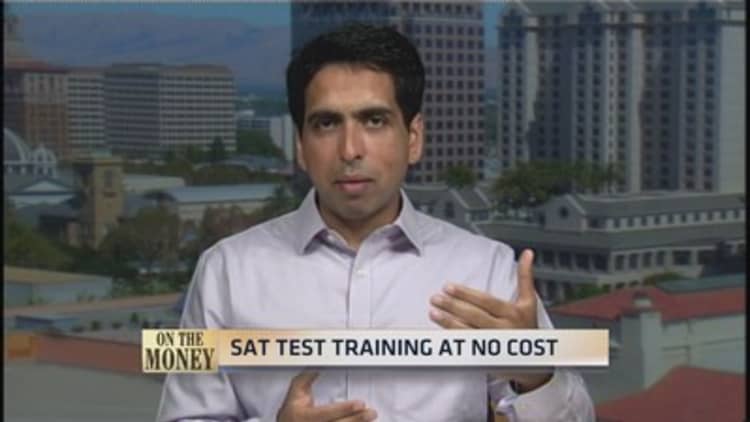
The blow to students of a redesigned, more rigorous SAT college entrance exam may get softened by the offer of a free test prep program.
The College Board, which administers the test, has teamed up with education nonprofit Khan Academy, which provides technology intensive instruction in math, art, computer programming, economics and a host of other topics. Khan's mission with The College Board will be to provide students with the resources they need to prepare for the new test coming in March. The best part is that it won't cost the kids a dime.
The program, launched by Khan Academy this month, will include online tutorials in math, reading and writing. It also provides practice tests to familiarize students with the changes they should expect on the exam.
Read MoreAn MBA is just a click away. What that means for brick and mortar schools
While it may be surprising that the 115-year-old College Board decided to partner with a 6-year-old start-up, the organization has been looking for ways to provide more access to less affluent students. The academy draws its funding from a number of outside sources, including venture capital, the Bill and Melinda Gates Foundation and Google.
"There's always been this perceived and maybe actual unleveling of the playing field because of the test prep industry," explained Khan Academy founder and CEO Salman Khan. "I think it was pretty forward thinking of them to say, 'Look, we're going to call it out, and we're going to work with the Khan Academy to make great test prep.' "
Helping disadvantaged students do better
One of the reasons they may be targeting standardized test prep schools, led by the likes of Kaplan and The Princeton Review, is because higher SAT scores appear to correlate with how wealthy the parents are.
In 2014, the average test score for students with parents making less than $20,000 was 1,324, according to data from FairTest and The College Board. The scores continue to increase as parental income increases: those whose parents make $200,000 or more score 1,722 on average, the data showed.
The concern is the more disposable income parents have, the more money they are likely to spend on things like test prep for their teens—who receive an advantage poorer teens may not have.
Khan Academy, which currently reaches 15 million students through its online offerings, is enlisting the help of the Boys & Girls Clubs of America to ensure it reaches students at a disadvantage who have little to no Internet access. This organization serves nearly 4 million members annually in more than 4,100 club locations.
Read MoreDigital cracks the final frontier: Law school
If Khan's school is able to disrupt the test prep industry, what might their model mean for the education system as we know it?
"We don't view these as a replacement for … human interaction," said Khan. "Different learners learn different things in different ways. If you can get explanations on demand at your own time and pace, if you can get as much exercise as you need with feedback, that's great."
However, "we even see on Khan Academy itself students who have what we call coaches or teachers to help them stay motivated, they can get even more engaged," he added.
"On the Money" airs on CNBC Sundays at 7:30 p.m., or check listings for air times in local markets.


